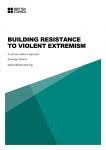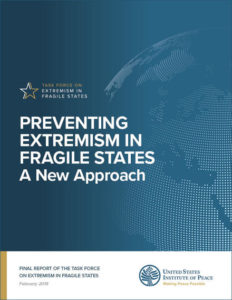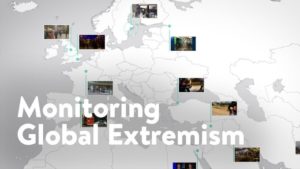 Violent extremist groups continue to grow from the sense of injustice, futility, and betrayal that stems from predatory state behavior. A comprehensive countering strategy needs to focus squarely on creating leverage for citizens to exercise their democratic power and authority, according to Lauren Van Metre, Senior Advisor for Peace, Security, and Democratic Resilience at the National Democratic Institute, and Linda Bishai, Director of Research, Evaluation, and Learning at the American Bar Association’s Rule of Law Initiative.
Violent extremist groups continue to grow from the sense of injustice, futility, and betrayal that stems from predatory state behavior. A comprehensive countering strategy needs to focus squarely on creating leverage for citizens to exercise their democratic power and authority, according to Lauren Van Metre, Senior Advisor for Peace, Security, and Democratic Resilience at the National Democratic Institute, and Linda Bishai, Director of Research, Evaluation, and Learning at the American Bar Association’s Rule of Law Initiative.
So what is the alternative to the current, predominantly security-focused approach to violent extremism? The first thing to do is reframe the problem. We need to shed the idea of fragile states that are too weak to counter the extremist threat, they write for Just Security:
 The often-cited distinction between states that are too weak to combat violent extremism and those that are simply unwilling to do so is too simplistic and misleading. Given the behavior of predatory elites, the presence of violent conflict in so-called fragile states seems more like a conscious choice to underfund certain institutions or abandon peripheral regions to gain from corruption or profit from conflict. It is through localized violence and mal-governed spaces that violent extremist groups enter and take hold.
The often-cited distinction between states that are too weak to combat violent extremism and those that are simply unwilling to do so is too simplistic and misleading. Given the behavior of predatory elites, the presence of violent conflict in so-called fragile states seems more like a conscious choice to underfund certain institutions or abandon peripheral regions to gain from corruption or profit from conflict. It is through localized violence and mal-governed spaces that violent extremist groups enter and take hold.
Once the violent extremist problem is reframed as a state predation problem, what are the options? Van Metre and Bishai ask:
- The first challenge is the current approach of U.S. foreign policy. In a political climate in which corrupt despots are painted as critical security partners in the war on terror, how do we make the case that holding these governments accountable is not only in the U.S. interest but actually a better solution to dealing with the threat of extremist violence? One answer might be the new generation of political leaders in the United States and their interest in addressing gross inequality by holding power and money accountable – at home and abroad. This issue affects developed and developing states alike; it’s a moment of global reckoning…
- The second challenge is to devise a strategy that directly targets state predation, recognizing that it cannot be left up to predatory elites to transform themselves. Such an approach must target the entire system, creating a new political-economy ecosystem; shutting off financial safe havens; and dismantling the mechanisms of predation. …Robin Lewis, associate fellow at the Brookings Institution and co-author of its Financial and Digital Inclusion Reports, agrees that the conflict prevention aspects of financial inclusion need to be emphasized and prioritized.
 The final prong of this strategy is to dismantle the predatory mechanisms that abuse and brutally exploit citizens and drive them to radicalization and support for extremism. This requires Western donors to reform and rebalance democracy and governance programming, no longer turning a blind eye to how it may be enabling political party patronage systems and their armed youth and militia groups.
The final prong of this strategy is to dismantle the predatory mechanisms that abuse and brutally exploit citizens and drive them to radicalization and support for extremism. This requires Western donors to reform and rebalance democracy and governance programming, no longer turning a blind eye to how it may be enabling political party patronage systems and their armed youth and militia groups.
Nearly two decades after the September 11 attacks, the principles of combating radicalization and recruitment remain a key objective in the National Strategy for Counterterrorism, the Washington Institute for Near East Policy adds. As plans to implement that strategy take shape, some have questioned whether the Trump administration is truly committed to countering violent extremism, including whether it has the means, will, and imagination to effectively inoculate communities against extremist ideologies.
To assess the state of the U.S. government’s counter-radicalization effort and offer new ideas for this persistent policy challenge, The Washington Institute hosts a Policy Forum with:
Farah Pandith, the State Department’s first-ever U.S. representative to Muslim communities and a veteran of Republican and Democratic administrations, is the author of the just-published book How We Win: How Cutting-Edge Entrepreneurs, Political Visionaries, Enlightened Business Leaders, and Social Media Mavens Can Defeat the Extremist Threat (HarperCollins, 2019).

Source: Institute for Global Change
Juan Zarate served as deputy assistant to the president and deputy national security advisor for combating terrorism in the George W. Bush administration. He is currently the chairman and cofounder of the Financial Integrity Network, a senior advisor at the Center for Strategic and International Studies, and a visiting lecturer at Harvard Law School.
Matthew Levitt is the Fromer-Wexler Fellow and director of the Reinhard Program on Counterterrorism and Intelligence at The Washington Institute, where he has convened three bipartisan study groups on countering violent extremism. Previously, he served as deputy assistant secretary for intelligence and analysis at the Treasury Department and as an FBI counterterrorism analyst.
This event will be held at The Washington Institute, 1111 19th Street NW, Suite 500, Washington, DC, 20036. It will also be broadcast live on the WINEP website. To register for this limited-capacity event, please use this ONLINE EVENT REGISTRATION FORM







